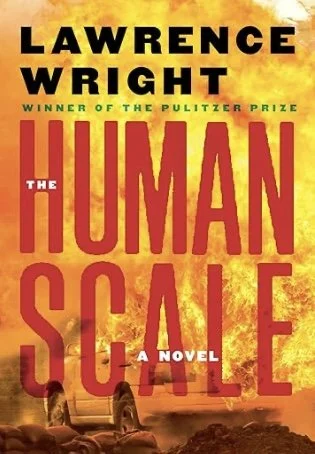The Human Scale by Lawrence Wright (Knopf) ~Janet Brown
Anthony Malik is the only survivor of a terrorist bomb blast, one that cost him his right eye, his memory, his relationship, and quite possibly his job. As a member of the FBI, he is given medical leave but this is running out and he’s still not back to the man he used to be. To fill up a barren stretch of time, he turns to Facebook in search of his father’s roots in Palestine and discovers family members whom he never knew existed. One of his cousins is getting married and she invites Malik to come to the West Bank for the wedding.
The Bureau tosses Malik a simple job that will give him a professional reason to be in Palestine, a meeting with an Israeli policeman who has asked for help. But soon after Malik arrives in Hebron, this man is brutally murdered. Malik comes under Israeli scrutiny as “Moishe Dayan,” since he shares an eyepatch with this national icon.
Because he’s an unknown quantity who appears to be Palestinian, the attention becomes intense, especially after all of Malik’s identification is stolen. Only a phone call to Jerusalem that verifies his status as a U.S. government employee keeps him from rigorous interrogation. Although Malik’s mother was a white girl from the South, his father’s genes are uppermost, which make him an asset and a liability in the West Bank.
From there, the plot devolves into a boilerplate thriller with a large cast of characters and a predictable ending. What saves it from being just another page-turner is its author.
Lawrence Wright is a journalist and author who won the Pulitzer Prize for his account of 9-11 and its causes. Since writing The Looming Tower, he’s decided to cloak his discoveries in novels, books that convey valuable facts within lackluster fiction. In the spring of 2020, when Covid-19 sent most of the world into isolation, Wright came out with The End of October (Asia by the Book, May 2020). Using his considerable talents as a journalist, he presented a carefully researched account that detailed the causes and effects of a global pandemic and conveyed that information through a number of stereotypical characters. His timing was impeccable but his release date was unfortunate since at that stage, most of the world’s bookstores were closed. For those who read a digital copy, his information was chilling and illuminating--and uncomfortably familiar. Still Wright found his winning formula, which he uses once again in The Human Scale.
Since October 2023, Gaza has dominated headlines and polarized opinions around the world. Clearly Wright has taken James Reston’s observation about Latin America to heart, “The people of the United States will do anything for Latin America except read about it,” and adapted it to the Middle East. Realizing all the current discourse about Palestine and Israel came from a vast swamp of passionate ignorance, Wright took everything he’s learned about the region and sprinkled this knowledge over the course of 425 pages. For most of his audience, this will be the only reason to keep reading until the end.
By the time the final page is turned, the history and background of Israel, Palestine, Zionism, and Hamas have been revealed, along with different voices from both sides. Contemporary factors are brought into play, ones that seem at first to be wild twists demanded by a thriller but that prove true when they are researched. The U.N. has issued reports of rampant drug traffic in the Middle East, with Syria supplying Captagon, a form of amphetamine laced with caffeine, and the Taliban providing heroin and cocaine. Fentanyl comes from the Sinaloa Cartel, channeled through Turkey. “The Middle East was a carnival of crooks and terrorists and smugglers…the dark matter of civilization,” Wright claims and the U.N.’s World Drug Report backs this up. Captagon, the report says, has been called the Jihadi pill since it was found to be used by “perpetrators of some terrorist attacks.” The U.N. has pinpointed Gaza’s tunnels as drug corridors as well as conduits for food and medical supplies.
Wright fleshes out his cardboard characters by giving texture to their activities. Through them he shows the halal method of killing a chicken, the proper way to mount and ride a camel, and an effective way to build a bomb. He uses them to give voice to their allegiance to ideologies, words that seem to have come directly from various interviews. Above all, he shows the tragic divergence from David Ben-Gurion’s belief that Israelis and Palestinians all descend from the same root and have historically been one people.
Skip over the fiction and go for the facts in a book that’s essentially a version of Israel and Palestine for Dummies. It’s a fine starting point.
